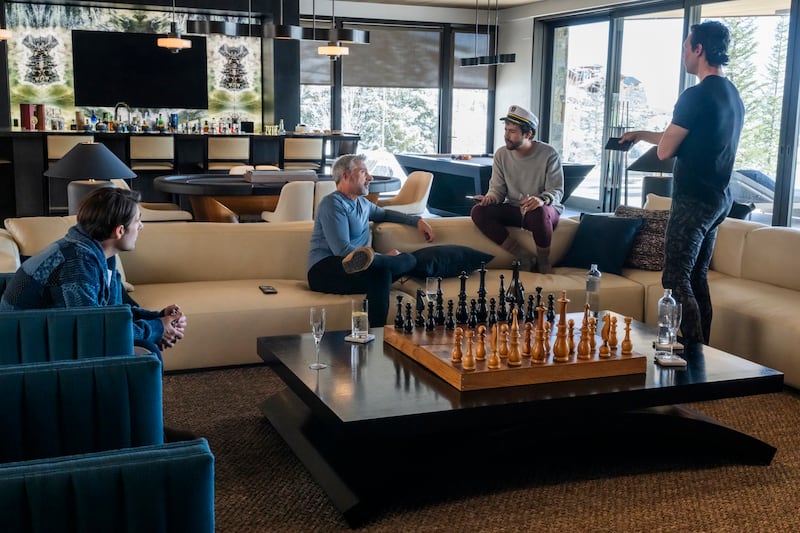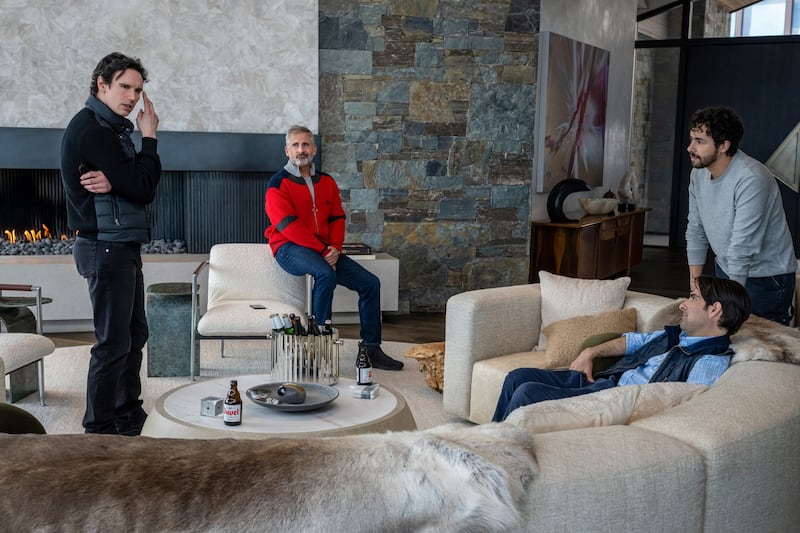Four chummy tech titans take their self-anointed status as masters of the universe all-too-seriously in Mountainhead, the directorial debut of Succession creator Jesse Armstrong.
Still fascinated with the psychological make-up of the ultra-rich and influential, Armstrong segues from the newsroom to a remote snowbound getaway where megalomania begets schemes that threaten the planet and aim to consolidate global power in the hands of a select few.
Prescient about the dangers posed by AI and, more pressingly, the cutthroat, avaricious, and egotistical madmen who wield it, the film—premiering May 30 on HBO—is an incisive portrait of 21st-century villainy, if ultimately a satire that can’t quite locate the funny in the horror.
At his newly built enclave on the slope of a forested mountain, Hugo Van Yalk (Jason Schwartzman) welcomes the arrival of his billionaire BFFs Randall (Steve Carell), Venis (Cory Michael Smith), and Jeff (Ramy Youssef). This is an annual boys-weekend event in which the rules are “no deals, no meals, no high heels,” and is meant to be spent playing poker, hanging out, and snowmobiling to a ridge where they scrawl their net worth on their chests in red lipstick, don hats that denote their financial ranking in the group, and scream their desires into existence in an act they dub “mountain god accelerator legacy manifestation.”

It’s a psycho alpha wish-fulfillment performance that’s emblematic of these individuals’ unchecked narcissism, and as with the rest of the proceedings, it’s elevated by spot-on turns from the cast, led by Smith as a bigwig whose mixture of awkward faux-naturalness and out-there nuttiness recalls Elon Musk.
Randall is dying of incurable cancer, and on the flight to “Mountainhead” (the goofy name given to this residence by Hugo), he tells his doctor that it must be treatable. His refusal to take no for an answer—or to imagine that he’s anything less than invincible—is shared by his pals. Hugo is the poorest of the lot due to his meager $521 million fortune, and eager to convince one of his friends to invest in Slowzo, a meditation “super-app” that’s bleeding cash.
Venis is the top dog, but the recent rollout of new features for his social media app Traam has sown geopolitical chaos, ushering in an age of rampant disinformation that’s rapidly escalating political and financial turmoil in Central Europe, South Asia, and, as time goes on, every major nation. Moreover, things are tense between him and Jeff due to prior podcast slander and, also, Jeff’s cutting-edge, responsible, and reliable AI platform, which Venis covets to fix his problems.
Not that Venis is willing to admit he has any problems; throughout Mountainhead, all four characters view everything—good, bad, and ugly—as either a sign of their brilliance and dominance or an opportunity to expand their reach and reconfirm their preeminence.
Thus, Venis doesn’t assess the ongoing global meltdown playing out on everyone’s phones (including burning bodies, murders, and rapes) as a negative. On the contrary, it’s merely part of the learning curve for revolutionary tech, and the only response is to “Push through! Let’s f—ing go!” He and his mates are the Four Horsemen of the Bro-pocalypse, and Armstrong’s script sharply conveys the bullheaded arrogance, self-admiration, and entitlement of such men, who don’t just consider themselves above the law and morality—they think themselves gods, and act accordingly.

(Warning: Some spoilers ahead.)
At least, all of them do except Jeff, who’s uninterested in selling his lucrative creation to save jerky Venis’ hide, and if their tension is the first ripple in Mountainhead‘s pond, Jeff’s net-worth ascension (thanks to Venis’ crisis, which has driven the masses to his AI) rankles Randall, even if Randall pretends not to care.
As kindred spirits, they’re all single-mindedly selfish and competitive. Still, for a while, they remain on good terms, in large part thanks to an idea, first floated casually and then taken seriously, that the solution for the escalating emergency—which nets Venis a call from the President, whom Randall dismisses as a “simpleton”—is to begin orchestrating coups around the world and installing themselves as various nations’ new leaders.
Given that they have the connections and resources to manipulate politicians, banks, power grids, and myriad other infrastructure centers, this turns out to be an easy task for the quartet, and discussed—scarily—as Hugo puts out cold cuts and other snacks in the kitchen.
At this point, Mountainhead transforms from a character study into a deranged black comedy, with the foursome debating the pros and cons of becoming tyrants. Randall justifies this as akin to the great turning points in history (like the creation of the wheel), and Hugo opines that their plan is “way fucking cool” but if they take down China, “now we’re making memories.”
Armstrong’s action is driven by an endless stream of corporate CEO jargon and tech-speak that functions as these cretin’s personal language, and via their endless chitchat, their true motivations become clear: Venis wants rise above the fray and usher in a “trans-human” future; Randall covets a digital-sentience reality that will let him live on after his diseased body perishes; and Hugo pines for equality with his peers—which is achievable if he can persuade them to believe that “if you bust a b-nut into this app, it will give birth to a unicorn.”
Jeff is the relative moral conscience of this upper-crust crew, and his reluctance to simply go with the flow makes him seem, in the eyes of his mates, a “decelerant” who doesn’t value their vision of “progress.”
Consequently, he becomes the prime focus of Mountainhead‘s second half, when things take a drastic turn that Armstrong dramatizes through both conversations which corroborate what we already know about these guys, and outrageous plots that are ill-fittingly cartoonish and never rise to the level of amusing.

Similarly, the writer/director strains to make sure we know he deems his protagonists fundamentally less competent than they imagine—notably, courtesy of a couple of gags at Randall’s expense that play as too jokey and obvious for the material at hand.
Unlike Succession, Mountainhead doesn’t have even a shred of empathy for its 1 percenters, casting them as lethal buffoons apt to kill us all in order to acquire another piece of the pie. However, by rendering them all as unlikable villains who, to the end, are happy to stab each other (and civilization) in the back, the film proves both persuasive and one-note—and frustratingly short on humor.
The post ‘Succession’ Creator Eviscerates Elon Musk Tech Bros in New Movie appeared first on The Daily Beast.




